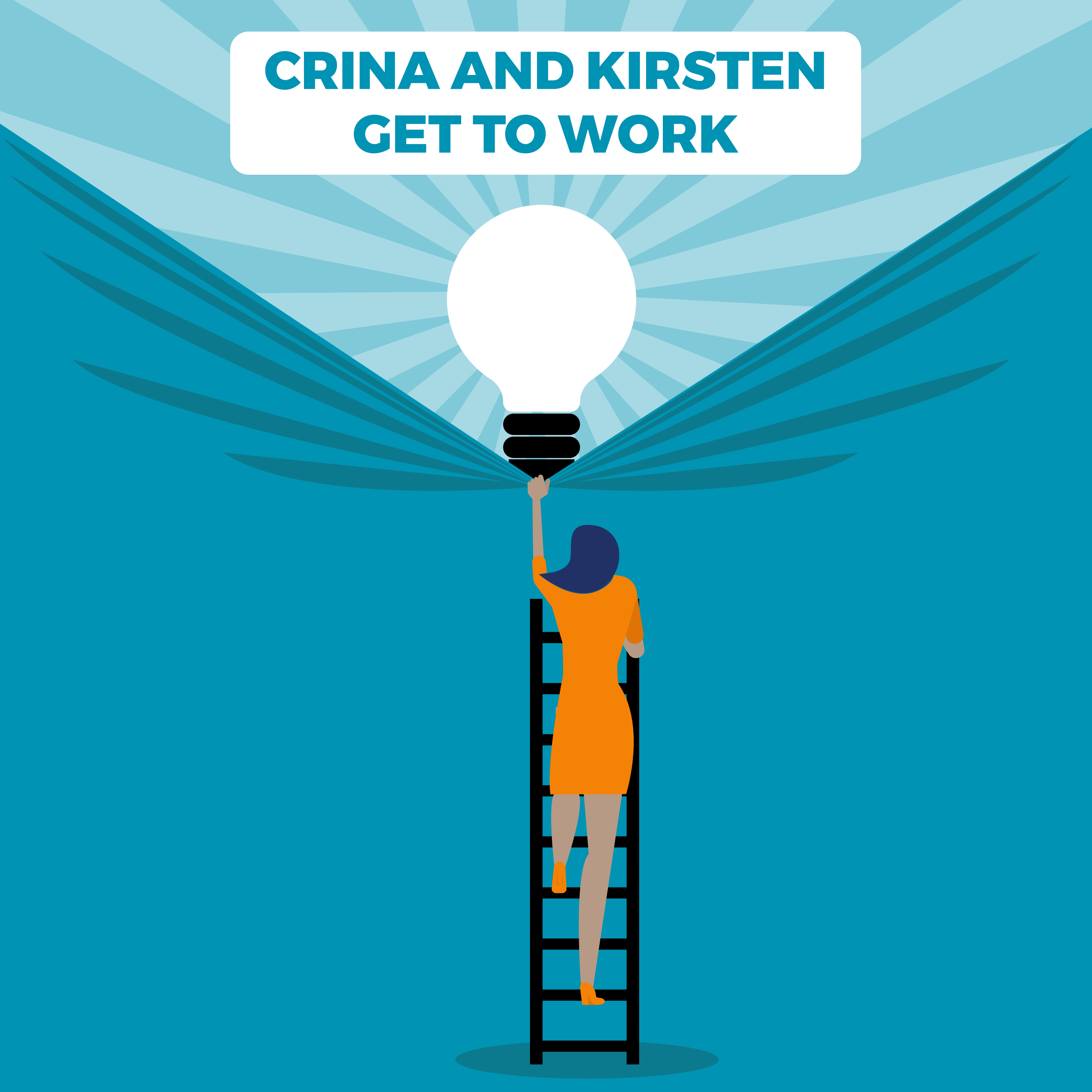Crina and Kirsten Get to Work

We have one single mission: Help women find ease, meaning and joy at work and in life. We use our experiences as business owners, entrepreneurs, mentors and inspirational leaders to explore topics that all working women care about: shitty bosses; smashing the patriarchy; balancing work and life; navigating change and getting what you want! We guarantee that you will be entertained and inspired... promise!
Episodes
Episodes



Friday Sep 10, 2021
Hold the line, Sister. Your Boundaries Define Who You Are.
Friday Sep 10, 2021
Friday Sep 10, 2021
Healthy boundaries at work can make the difference between professional fulfillment or burnout. Boundaries are the physical, emotional, and mental limits we create to protect ourselves from over-committing, being used or behaving in unethical ways.
SHOW NOTES
Boundaries separate what we think and feel from the thoughts and feelings of others. How to Define Healthy Boundaries at Work — Melody Wilding
Crina talks about capital “B” boundaries that are strong, not subject to negotiation with little flexibility. Lower case “b” boundaries are more porous, flexible and may change depending on circumstances.
A boundary is a container around your time, mental and emotional energy, relationships, physical body and material and energetic resources.
Where do we see boundaries at work?
How you spend your time
What you agree to do - or not do
How you spend your energy
What do you need for your physical space
How you want to communicate in the office
Our job descriptions and our fte status are significant boundaries at work.
Boundaries are important because they allow you to be more of you. They walk hand in hand with our self-worth. They allow us to maintain our energy and resilience. They guide healthy relationships.
We see boundaries in action at work when we do not allow others to speak to us in a rude or condescending manner, when we protect our space - a closed door, separation from a co-worker in a meeting, setting priorities in your work.
Boundaries between work and our personal lives are also important. Workers tend to fall into three categories as they define their work and personal boundaries - separators, integrators and cyclers. Separators are 9 to 5ers (or whatever the hours) - folks who clock in and clock out and work and personal do not bleed into each other. Integrators tend to go between work and personal all of the time - these are the folks who cannot tell you how much they work because they are meshing their work and personal lives to a significant degree. Cyclers are those folks who spend a significant amount of their energy and time on work in big chunks - firefighters who work for a week and then are off for a week. Understanding how you separate work and personal is helpful in analyzing your own boundaries and whether those are respected.
Our hosts conclude with examples of boundaries gone bad in the workplace.
More good reads:
Kossek inpress10 Managing Work-Life Boundaries in the Digital Age.pdf (bc.edu)
How to set clear work boundaries — and stick to them | (ted.com)
The Successful Woman’s Guide to Setting Boundaries – Without Being a Bitch - Women Igniting Change



Friday Aug 27, 2021
Finding Meaning at Work Part 2: Crafting Your Job
Friday Aug 27, 2021
Friday Aug 27, 2021
You will find meaning and purpose in your work when you are able to craft, change, modify and align your daily tasks to match your values. In fact, some say that finding meaning at work is more about what you do with what you have, instead of what you start with.
SHOW NOTES
In this episode of Crina and Kirsten Get to Work, our hosts tackle part II of this two-part series on meaning in the workplace. In Part I, Crina and Kirsten discussed the importance of meaning at work and that meaning arises when we find alignment with our values.
Identifying our values allows us, hopefully, to match those values to those of our employer. This is where our internal work on values can overlap with the external world – in this case our employer.
The good news is that meaning is more about what we do with what we have instead of what we start with. Some folks may be in a job that completely aligns with their values – maybe a teacher who values teaching and children and being of service and her employer supports her in those values. Not that she loves everything she does, but her internal values coincide with her external work experience.
So, what do we do when that is not the case?
There are a number of ways to modify our internal and external worlds to align with our values and create meaning.
Amy Wresniewski. professor of Organizational Behavior at the Yale School of Management, with the assistance of her colleagues, introduced the concept of job crafting. In studying the work of a group of janitors at a hospital, she discovered the janitors experienced the same job in different ways – and fell into two distinct groups. One group saw themselves as just janitors, did not think they were highly skilled and would describe their job as cleaning. The other group talked about their work in relation to patients and visitors’ care. In fact, most of how those in this second group described their job was not even in the job description. They discussed tasks such as changing the art on the walls of patients who were in a coma or cleaning the floor extra times in the rooms of patients who did not have visitors, or guiding visitors to where they were going. This second group viewed their work as providing a safe and clean place for people to get healthy and heal or as ambassadors for the hospital. She called what the second group was doing job crafting.
Wresniewski describes job crafting as “[w}hat employees do to redesign their own jobs in ways that foster engagement at work, job satisfaction, resilience and thriving.” (Berg, Wrzensniewski and Dutton, 2010) Job crafting can be changing the task you perform – adding or dropping responsibilities – like the janitor cleaning the floor of a lonely patient several times a day. It can also be in creating certain types of interactions – who do we want to work with and how? We can choose who we brainstorm with, sometimes who we work with on a project and even sometimes who we serve so that these people add meaning to our work. Job crafting can also be changing your mindset about what you are doing, which is also something the janitors did – realizing their job was not cleaning floors, but providing a place for people to heal and get well.
People who job craft tend to have more satisfaction, commitment, happiness and better performance in and with their jobs. It is a really good way for people to find meaning at work.
Employees will likely job craft– often not even being aware of it. Managers and supervisors should recognize this and support it. We know it has an incredibly positive effect in the workplace when employees find meaning in their work – and job crafting is one significant way employees find meaning in their work. Leadership can consider:
Giving autonomy and support to employees
Encouraging employees to identify their values and create plans for themselves at work that align with those values
Communicating company values and goals so employees can see how they fit into achieving those goals and living those values
Allowing and encouraging task reassignment that fits values, such as holding a job crafting “swap meet” where people talk about whether given values and strengths of each employee, certain tasks can be traded.
Recognizing and celebrating and supporting employees who take the ownership in their work necessary to job craft.
And here are some good reads:
Job Crafting - Amy Wrzesniewski on creating meaning in your own work
The 4-Hour Meaning Week. 4 power-hours of super-meaning per week… | by Taylor Foreman | The Startup | Jul, 2021
Help your employees find purpose--or watch them leave
Igniting individual purpose in times of crisis
The Why Of Work: Purpose And Meaning Really Do Matter
Positive Workplace What is Job Crafting? (Incl. 5 Examples and Exercises)



Friday Aug 13, 2021
Finding Meaning at Work Part 1:Harnessing Your Values
Friday Aug 13, 2021
Friday Aug 13, 2021
A key to finding meaning at work lies in your ability to align your daily tasks with your values. It doesn’t matter what kind of work you do, it only matters that you, personally, know what you care about and express those values in your job. When you find meaning, or purpose, at work you are more productive, healthier, resilient, and more fun to be around!
SHOW NOTES
In Part I of a two part series on finding meaning at work, our hale and happy hosts spend some time diving into what meaning is, why it is important and the backbone of meaning - identifying your values.
What are we talking about when we say meaning? Meaning is the connection between two or more things or ideas that together fulfill a higher purpose, create esteem or admiration, have a positive impact, transcend our instincts or our view of what we can achieve or makes sense (aka lofty goals). This is according to Kirsten and The Meaning of Life (Stanford Encyclopedia of Philosophy)
Meaning is not happiness, it is not good character. It is the connection between ourselves and one of those “lofty goals.” Sometimes we find meaning because we are providing for our families, or helping someone else, being of service, discovering something new, solving problems, protecting the environment etc . . .
WHY IS IT IMPORTANT?
“People who live their purpose at work are more productive than people who don’t. They are also healthier, more resilient, and more likely to stay at the company. Moreover, when employees feel that their purpose is aligned with the organization’s purpose, the benefits expand to include stronger employee engagement, heightened loyalty, and a greater willingness to recommend the company to others.” Help your employees find purpose--or watch them leave
Simply put - meaning is good for us and good for the workplace. Meaning at work makes us:
2.5 times more likely to be free of dementia
22 percent less likely to exhibit risk factors for stroke
52 percent less likely to have experienced a stroke
And if this wasn’t enough, individual purpose benefits organizations, too… People who find their individual purpose congruent with their jobs tend to get more meaning from their roles, making them more productive and more likely to outperform their peers. Igniting individual purpose in times of crisis.
HOW DO WE FIND MEANING:
Ideally, work is a place where you can express your values - it is a calling. There are external factors - the work and the workplace that affect this and well an internal factors.
As always, the good and bad news is that we have more ability to affect change when it comes to our internal experience.
Identify Your Values
Values are the things that are most important in our lives. When values and goals are aligned, we are much more likely to motivate ourselves towards action and success.
According to Simon Senik values need to be actionable Here is his terrific TEDTalk: Honesty is NOT a Value | Simon Sinek Values are not nouns, but actions. He gives these great examples:
Honesty vs “tell the truth”
Innovation vs “allow for experimentation”
Humor vs. “laugh everyday”
Most of us have a sense of our values and can list our values. However, it is interesting to move past your assumptions and reflect on them from an independent source. For example, The Values Project is a decades-long effort to get people in touch with their values. Click on the link to test your assumptions about your values. The Values Project | Let's reveal what matters to you. Getting clear on your values is the first step to finding meaning at work.



Friday Jul 30, 2021
The Best Coworkers are Trauma-Informed
Friday Jul 30, 2021
Friday Jul 30, 2021
Trauma and toxic stress is pervasive in the workplace. You, your friends, your coworkers are all dealing with some version of trauma from, among other things, adverse childhood experiences, the pandemic, climate change, natural disasters, poverty and racism. While all events impact us individually, it’s important to recognize the signs of trauma and normalize trauma-informed workplaces.
In this episode of Crina and Kirsten Get to Work, our dynamic duo takes on trauma. The pandemic is a traumatic event, whether we know it or not - although its impacts on us individually are very different.
This episode draws from an article advancing a trauma informed approach to work - and while we of course need to be aware of our own trauma, being aware of co-workers’ trauma is important in creating the kind of workplace we all want - one with ease, meaning and joy.
Here is the article. TRAUMA-INFORMED APPROACH TO WORKFORCE
Trauma is physically or emotionally harmful or life threatening experiences with lasting adverse effects on our functioning, mental, physical, social, emotional, or spiritual well-being. This can be things like a physical assault, verbal abuse, witnessing someone else endure these experiences. Kirsten and Crina think that toxic and prolonged stress has much the same effect as trauma. Think the pandemic, racism, political unrest - yes, friends, we have had it all.
When we experience trauma or toxic stress, we can feel disassociated, persecuted, depressed, negative and disheartened. We can experience physical pain and discomfort, nightmares, insomnia, mood swings and panic attacks. And things we may struggle with in normal times, like anxiety, become more difficult to deal with.
Our brains are literally hard-wired to deal with trauma and toxic stress. When the brain senses danger, the amygdala springs into action, which causes the sympathetic nervous system to fight, take flight, or freeze. Blood and oxygen are diverted to muscles and away from our brains, and a surge of adrenaline enables us to fight or take flight. Cortisol is released to inhibit any pain that might slow us down. All systems not crucial to survival are suppressed. Basically, the “survival” brain overrides the “rational” or “thinking brain” in the cerebral cortex, where rational thought and executive functioning, like problem solving and cooperating with others, take place. And when your brain sends these signals over and over again, well, it is overwhelming. Now, imagine that you have to show up and work - or these things are going on at your work - yikes!
Most importantly, we need to manage our own trauma and toxic stress - and there are some great strategies for doing so: get outside, connect with people you love and who are energy giving, simplify your life, love on your dogs and cats, find something to be grateful for - (chocolate?), extend grace and compassion to yourself, and reset your nervous system with yoga, breathing, meditation and movement in general.
After addressing what we can do about our own trauma and toxic stress, Crina and Kirsten dive into what about others’ trauma and toxic stress in the workplace. And there are a lot of folks in the workplace with trauma and toxic stress - in fact two-thirds of us have experienced some kind of childhood trauma.
The first step is to educate ourselves - like this podcast! The next step is to normalize these experiences. And provide space for these experiences. As a co-worker, look for the signs of trauma and stress. Be curious, listen and if someone does open up to you, try not to problem solve unless specifically asked, be a witness, hold space. One on one check ins are a great opportunity for this.
If you are in a place to influence the workplace, encourage employees to take breaks, make sure the break room is not just caffeine and sugar, institute scheduled stretching times, consider an educational program for all staff on these issues.
As Oprah says, “I'm really proud to say that even in my worst moments, I've always had the good sense to know that however bad things were, they wouldn't remain so."
A TRAUMA-INFORMED APPROACH TO WORKFORCE
Signs & Symptoms of Psychological & Emotional Trauma | Cascade Behavioral Health



Friday Jul 16, 2021
Difficult Conversations Don't Need to Suck
Friday Jul 16, 2021
Friday Jul 16, 2021
Advocating for yourself, confronting a coworker, asking for a raise...these courageous conversations are nerve wracking at best and in some cases, cause great anxiety. But avoiding difficult conversations is not an option if you want ease, meaning and joy at work.
SHOW NOTES
As most of us know – things are bad out there. We are fractured about politics, COVID, black lives and all sort of other things. As we have become fractured and unable to engage in meaningful conversation about our positions, beliefs and opinions, we “other” each other.
“Pew Research did a study of 10,000 American adults, and they found that at this moment, we are more polarized, we are more divided, than we ever have been in history. We're less likely to compromise, which means we're not listening to each other. And we make decisions about where to live, who to marry and even who our friends are going to be, based on what we already believe. Again, that means we're not listening to each other. A conversation requires a balance between talking and listening, and somewhere along the way, we lost that balance.” Celeste Headlee: 10 ways to have a better conversation. When we do not know and understand each other, it is easier for us to dismiss, denigrate and discriminate against each other.
It turns out not addressing difficult issues is also creating problems at work. We spend almost three hours a week at work dealing with a workplace conflict caused by people who should have taken part in a difficult/courageous conversation. About a third of these conflicts lead to personal injury or attacks, 22% of us are sick because of these conflicts and about a third of us leave our jobs because of one of these conflicts that could be solved with difficult conversations. The Work Conversations We Dread the Most, According to Research.
What makes a difficult conversation so hard? It turns out that it is fear and embarrassment. Emotions are high – we are angry, upset, frustrated, disappointed. We are afraid we will lose something we will care about or something will challenge our identity and sense of self.
Once you identify an issue that calls for a difficult or courageous conversation – get yourself ready. BE CURIOUS. ASSUME THE BEST INTENTIONS IN THE OTHER PERSON AND GET OUT OF FAULT AND BLAME.
Once we get into the right mindset, we can plan our conversation.
What is the purpose?
What are your assumptions?
What emotional buttons do you anticipate being “pushed” and how do you keep calm when that happens?
What is your attitude about the conversation?
What are your needs and fears?
We Have to Talk: A Step-By-Step Checklist for Difficult Conversations | Judy Ringer
Plan the first thing you will say in the conversation. Getting off on the right foot is important? What is your opening line?
During the conversation ask questions, acknowledge the other person’s feelings and position, advocate for your position without minimizing the other person and be solution oriented.13 Ways To Have Difficult Conversations With Clients
Let’s get out there and have that difficult conversation in the most courageous way – we can do it!



Friday Jul 02, 2021
Attractive Women Make More Money
Friday Jul 02, 2021
Friday Jul 02, 2021
Every day before work, women shave, shampoo, condition, exfoliate, moisturize, cover-up, tone, powder, brush, style, spray, whiten, clip, paint, smooth, enhance, conceal, deodorize and pluck (did we miss anything?). In fact women spend an average of 27 minutes a day getting ready for work, use somewhere around 16 unique products on their bodies and spend thousands of dollars on clothes and shoes.
Why do we do this? Some women use clothes, hair and makeup as a form of self expression, which is great! But many of us spend time on appearances in order to protect ourselves, fit into the mold and be “acceptable.” Remember what the patriarchy told you: ladies need to look the part in order to be successful.
The truth of the matter is that a woman’s appearance can impact her income, status, and how others perceive her at work.
According to Leah D. Sheppard, an assistant professor at Washington State University who conducted a variety of experiments testing others' perception of attractive women, found that “beautiful women were perceived to be less truthful, less trustworthy as leaders, and more deserving of termination than their ordinary-looking female counterparts.”
On another note, a seminal study conducted by NYU sociologist Dalton Conley and NYU graduate student Rebecca Glauber found that women’s weight gain results in a decrease in both their income level and job prestige. By contrast, men experience no such negative effects.
According to a landmark study from Cornell University, white women who put on an additional 64 pounds, experienced a 9% drop in wages. And according to a 2007 paper from the U.S. Bureau of Labor Statistics, there is a statistically significant "wage penalty" for overweight and obese white women. ("Previous studies have shown that white women are the only race-gender group for which weight has a statistically significant effect on wages," according to the paper.) The obese take a bigger hit, with a wage loss of 12%.
And as if that isn’t enough, a more recent study by researchers at Harvard University, Boston University, and the Dana-Farber Cancer Institute found makeup was found to increase people’s perceptions of a woman’s likeability and trustworthiness as well.
And finally, although there is no correlation between height and effectiveness or intelligence, a woman who is 5 feet 7 inches tall--well above the national female average of 5 feet, 3.5 inches--will make $5,250 more over the course of a year than a female co-worker standing 5 feet 2 inches.
So what to do about it?
Be aware of your bias
Create a “work uniform” so you don’t have to spend so much time and money on outfits
Stop commenting on women’s appearances. No more, “How are you feeling?” “You look tired!”
According to Tracy Spicer:Take note of the number of minutes your personal grooming eats up over a day a week and month
Think about all the other things you could be doing
Decide what you can reduce or live without
Anonymous recruitment practices
Celebrate women of all shapes and sizes
And of course, the good reads:
For Women in Business, Beauty Is a Liability
Your looks and your job
Think Looks Don't Matter? Think Again
The double standards women face at work every day
The lady stripped bare | Tracey Spicer | TEDxSouthBankWomen



Friday Jun 18, 2021
The Urgency Trap
Friday Jun 18, 2021
Friday Jun 18, 2021
When every one of your tasks is urgent, you quickly lose control. In fact, when trapped by urgency, your stress increases, your judgement declines and your anger and anxiety become front-and-center. So how to get out of the urgency trap and start getting yourself some ease, meaning and joy at work? The answers might surprise you!
SHOW NOTES
In the episode of Crina and Kirsten Get to Work our hosts tackle one of the most significant negative impacts on your ease, meaning and joy in the workplace - URGENCY! Yes, the topic is the hair-raising, spine-tingling, sweat producing, pulse racing and shallow breathing of urgency.
When something big or just everything feels urgent, we experience:
A rise in stress hormones
Executive function decline
Memory, judgement, impulse control deteriorate
Anger and anxiety centers of the brain are activated
And once we experience those things, we experience:
Low energy
Cravings
Insomnia
Irritability
Anxiety
Poor concentration
Before you read on - just consider for a moment the bullet points above - a buzzkill on your ease, meaning and joy!
When every task is the most urgent, it limits our mind’s ability to think creatively. Problem solving is nearly impossible, and we resort to rushed, bad decisions that cause our team’s more time and effort in the long run to correct.
Urgency also gets in the way of the things our higher selves want to accomplish - diversity, equity and inclusion, which require us to consider our biases and question our assumptions and conclusions. While we all experience urgency - white culture seems to embrace the nettle of urgency in an almost reverent manner. Sometimes we white folks equate our self worth with the urgency of our attention to someone or some task. WHITE SUPREMACY CULTURE: Characteristics
And while Crina and Kirsten like to give you good news, there is bad news here - our brains are hard wired to respond to urgency. In fact, in order to get our urgency rush, we will give up bigger rewards over the long term. See the reading below for the data and science behind “our brains on urgency.”
If we know urgency has negative effects on our physical, psychological and emotional capacity - and how effective we are at work, how do we minimize urgency - and note - our gals are realistic - urgency is our forever friend, but we have some boundaries with that frenemy urgency:
Set realistic work plans - and check you optimism (which in other areas Crina and Kirsten generally encourage, but optimism can really take us to a bad place if we are not realistic about work plans
Set aside time for planning
When we do planning - plan for urgency, what is your response
Think like an ER doctor - assess, prioritize and make a plan - An ER doctor on triaging your "crazy busy" life
Don't assume that "urgent" means "immediately"
Stop hurrying - awareness
Push back against your inner urgency bias by:Making lists
Challenge your own thinking - because we know we have an urgency bias
For those who want to dig in deeper - here are some great reads on the topic:
When every task is top priority,
My Sense of Urgency Is Killing Me (Slowly)
When Everything Is Urgent, Nothing Really Is
When everything feels urgent, choose significant instead
How to manage your time better by fighting "urgency bias" — Quartz at Work (qz.com)
WHITE SUPREMACY CULTURE: Characteristics
The Psychology of Urgency: 9 Ways to Drive Conversions



Friday Jun 04, 2021
Five Generations Walk Into an Office
Friday Jun 04, 2021
Friday Jun 04, 2021
For the first time in history, there are five generations in the workforce...yes, five! And while this might cause some struggles with communication (ahem...did someone say mute?), and possible differences of opinion, it turns out that we all want many of the same things. Yep, we’re talking about ease, meaning and joy.
SHOW NOTES
In this episode of Crina and Kirsten Get to Work our hosts consider the impact of five generations of humans on the workforce - yes 5!! Workers from their early seventies until their late teens. In their quest for ease, meaning and joy at work and at life, let’s dive into what this means for us!
The five generations in the workplace include:
Traditionalists – those in the early seventies or later. These folks are shaped by the Great Depression, World War II, radio and movies. They are motivated by respect, recognition, and providing long-term value to their employer. Their communication style is personal. Their worldview values obedience over individualism, age equals seniority and workers move up the ladder. These people are respectful and loyal.
Baby Boomers are in the mid fifties to early seventies. These folks are shaped by the Vietnam War, the Civil Rights Movement and Watergate. They are motivated by company loyalty, teamwork and duty. The communication style of these people is varied - face to face, person, phone - whatever works. Their worldview is that achievement comes after paying one’s dues; and sacrifice equals success.
Generation X are folks in their early forties to mid fifties. They were shaped by the AIDS epidemic, the fall of the Berlin Wall and the dot.com boom. They are motivated by diversity, work life balance and their own personal-professional interests rather than company interests. Their worldview favors diversity, they are quick to move on if the employer fails to meet their needs, resistant to changes at work when it impacts their personal interests. Their communication style is also what is most efficient.
Millennials are folks who are twenty-one to forty. They were shaped by Columbine, 9/11 and the internet. They are motivated by responsibility, the quality of their manager and unique work experience. Their world view is seeking challenge, growth, and development; a fun work life and work-life balance; likely to leave an organization if they don't like change. Their communication style isIMs, texts, and email.
Generation Z are folks twenty and younger. They were shaped by the Great Recession technology from a young age. They are motivated by diversity, personalization, individuality and creativity. Their communication style is IMs, texts, social media. They are self-identifying as digital device addicts; and value independence and individuality.
See [Infographic]Generational Differences in the Workplace [Infographic]
Lots has changed for some of these folks. There are more women in the workplace, less religion, fewer veterans and less people who are married. How Millennials today compare with their grandparents 50 years ago
It turns out that we can make gross generalizations about each other - see above - :-)! And it also turns out we make even more assumptions about how others think of us.
We all want the same four things:
Working for someone who care about employees well-being
Ethical leadership
Diverse and inclusion of all people
FInancial stability
Tune in and learn how our alikeness is more important than our differences and how our differences create more ease, meaning and joy at work.
And more good reads:
4 Things Gen Z and Millennials Expect From Their Workplace
Just How Different Are Millennials, Gen Xers, and Baby Boomers at Work?
Generations in the Workplace
Managing People from 5 Generations
How Millennials today compare with their grandparents 50 years ago

Crina and Kirsten Get to Work
Crina and Kirsten dish on all things related to women and work. Through engaging conversations and witty banter, they will inspire you to seize your power and create meaningful, joyous, fun and rewarding work in their business podcast. While exploring motivational podcast topics such as authenticity, shitty bosses, friends and negotiation, Crina and Kirsten lift up women and show the patriarchy “the hand” and “the finger”.








